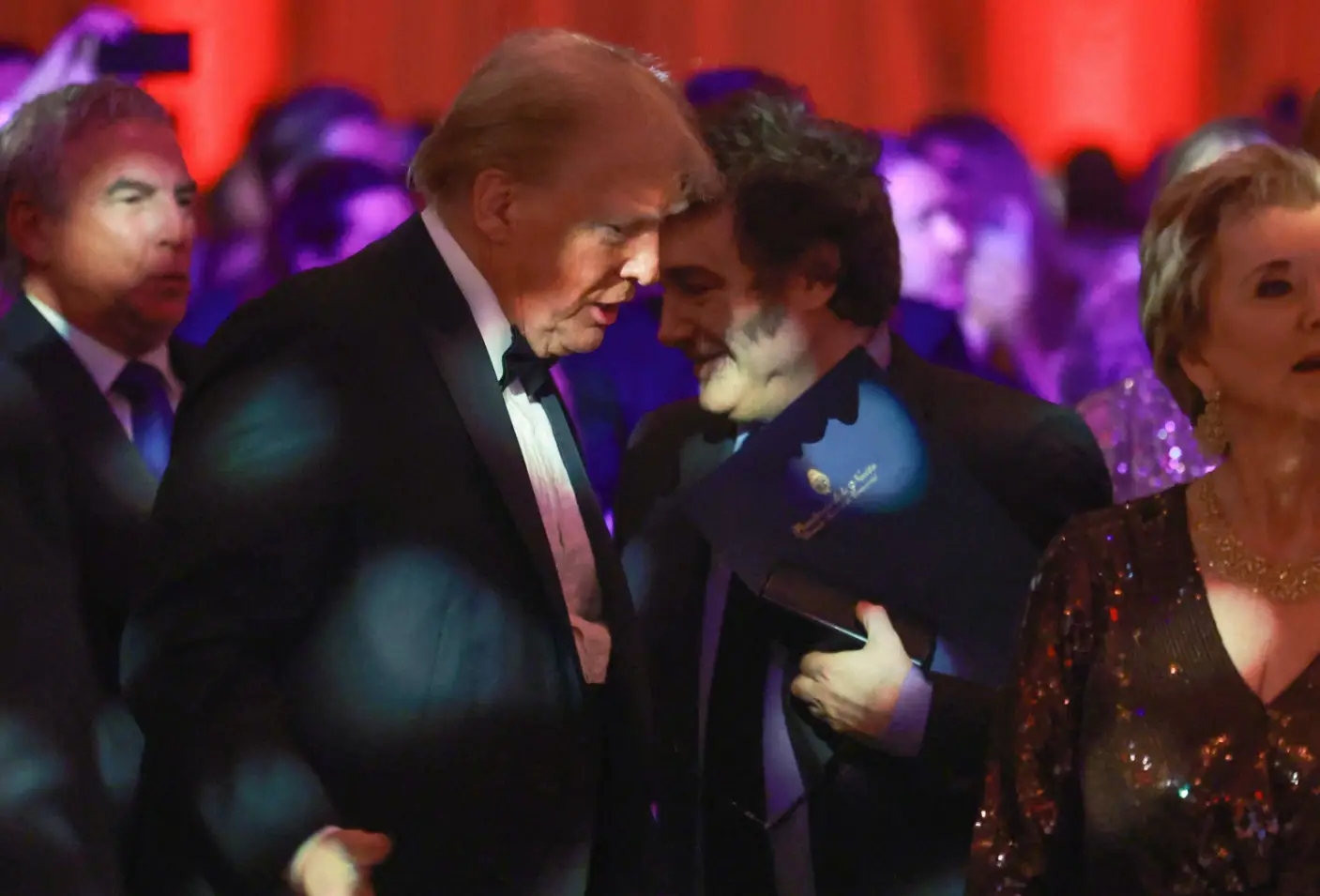The recent reelection of Donald Trump in the United States generated discontent in several center-left Latin American governments — whether in big countries such as Brazil, Mexico and Colombia, or in smaller nations such as Guatemala and Honduras, which considered that a continuity, represented by the Harris-Walz formula, offered more possibilities for dialogue and cooperation. However, not all the region’s rulers received the victory of the former Republican president with displeasure. In Argentina, Trump’s election was celebrated with enthusiasm.
An accomplice in Latin America
Unlike most of his regional neighbors, Argentina’s president, Javier Milei, has never hidden his sympathy for the Republican. At a recent meeting at CPAC (Conservative Action Policy Conference), Milei embraced Trump with enthusiasm and declared himself part of the “MAGA” movement, which, according to the Argentine president, not only stands for “Make America Great Again”, but also for “Make Argentina Great Again”. Once elected, Trump not only invited Milei to a reception at his Mar-a-Lago residence, but both appeared smiling alongside X (formerly Twitter) owner Elon Musk.
The proximity between Milei and the United States, however, is neither new nor limited to the figure of Trump. During Joe Biden’s administration, the Argentine government showed a remarkable alignment with U.S. foreign policy, especially in forums such as the UN. In fact, when Argentina’s representative, Diana Mondino, voted against the U.S. embargo on Cuba at the United Nations General Assembly, she was immediately replaced as foreign minister. This change once again underscored the centrality of the United States in the Milei administration’s foreign policy.
Given the evident personal and ideological affinity between Milei and Trump, it is worth asking whether we are facing a new era of “relaciones carnales” (“carnal relations”) between Argentina and the United States. The expression, coined by Carlos Menem’s foreign minister (1989-1999), Guido Di Tella, in the 1990s, referred to the close alignment with the United States, in the context of U.S. global hegemony, with the aim of obtaining political and economic benefits.
Although this position found theoretical support in the “peripheral realism” of political scientist Carlos Escudé, in practice it implied an almost total alignment with U.S. policies, whether under the Republican administration of George H. W. Bush (1989-1993) or the Democratic administration of Bill Clinton (1993-2001). This alignment included constant support for U.S. positions at the United Nations and the promotion of controversial initiatives such as the FTAA (Free Trade Area of the Americas) and Argentina’s participation in the U.S.-led coalition during the Gulf War (1990-1991), with direct military support.
Milei: a reflection of Menem
Milei has openly declared himself an admirer of Menem’s government. Recently, the Argentine president, accompanied by Zulema Menem, the former president’s daughter, unveiled a bust of the former president at the Casa Rosada. Throughout his career, Milei has made many references to the Menem period, especially highlighting the figure of Domingo Cavallo, Minister of Economy between 1991 and 1999, known for promoting liberal economic reforms and for establishing the convertibility regime, which established a fixed parity between the Argentine peso and the dollar, approaching a de facto dollarization of the economy.
For Milei, Cavallo is “the best Minister of Economy in history”, and his dollarization model is still a central reference in the President’s economic agenda. Therefore, it is clear that the association between Milei and Menem goes far beyond the coincidence of their initials and their characteristic personal styles. Both represent a combination of radical economic liberalism and a close foreign policy link to the United States. In fact, even during Biden’s presidency, one could already speak of a renewed version of “carnal relations” between Argentina and the United States.
However, this willingness to align with the United States becomes even more evident with the election of Trump. This shift is not only due to the political context, but also to a significant ideological coincidence between the Republican and the Argentine president. The MAGA movement is not just an acronym, but a political agenda shared by both governments. Domestically, it includes an extreme rejection of the left — identified in practice with the disqualification of any political adversary as “socialist” or “communist”, including Mauricio Macri’s PRO (Republican Proposal) allies, whom Milei has described as “yellow socialists” — an opposition to reproductive and LGBT rights, and the promotion of a deregulated and bureaucratized economy.
Externally, this agenda is reflected in strong support for Israel, a hardening of rhetoric toward China, and a disdain for multilateral institutions associated with the liberal international order, such as the United Nations and the WTO.
But while we can speak of “carnal relations” between the Milei administration and the Trump administration, these are not the same as in the 1990s. Menem’s relations with the United States were guided by a strategic pragmatism that sought concrete benefits through closeness with the hegemonic power. In contrast, those being forged between Milei and Trump are based on an ideological affinity and a shared worldview that seeks to challenge the principles of the liberal international order of the 1990s.
This new era of relations will also have significant implications for Argentine foreign policy in the region and the world. It is likely to intensify conflicts with leftist governments, both autocratic, such as those of Cuba, Nicaragua and Venezuela, and democratic, such as those of Mexico and Colombia, whose presidents were described, respectively, as “ignorant” and “murderous” by Milei.
Furthermore, in its alignment with Washington, the Argentine government could increasingly disagree with strategic partners such as Brazil, Chile and now also Uruguay, unlike Menem’s foreign policy, given the trade needs of the moment. On the other hand, although the link with the IMF will remain strong, Argentina will have to progressively distance itself from other multilateral organizations.
In short, the new “carnal relations” between Argentina and the United States are not a simple return to the past, but a reflection of a profoundly transformed global context. While Milei takes up part of the Menemist economic agenda, the relationship with the United States seems to be increasingly oriented by a radical critique of the universal values of the 1990s and the liberal international order they supported. This shift marks a new stage in the bilateral relationship, in which ideological convergence plays a central role.
*Machine translation proofread by Janaína da Silva












